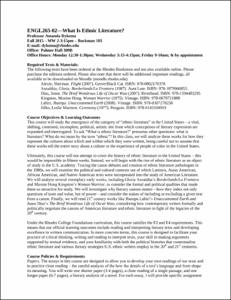Please use this identifier to cite or link to this item:
http://hdl.handle.net/10267/30240| Title: | ENGL 265-02, Special Topics: What Is Ethnic Literature?, Fall 2015 |
| Authors: | Dykema, Amanda |
| Keywords: | English, Department of;Syllabus;Curriculum;2015 Fall |
| Issue Date: | Aug-2015 |
| Publisher: | Memphis, Tenn. : Rhodes College |
| Series/Report no.: | Syllabi CRN;16649 |
| Abstract: | This course will study the emergence of the category of “ethnic literature” in the United States—a vital, shifting, contested, incomplete, political, artistic site from which conceptions of literary expression are expanded and interrogated. To ask “What is ethnic literature?” presumes other questions: what is literature? What do we mean by the term “ethnic”? In this class, we will analyze these works for how they represent the cultures about which and within which they were written, being careful not to assume that these works tell the entire story about a culture or the experience of people of color in the United States. Ultimately, this course will not attempt to cover the history of ethnic literature in the United States – this would be impossible in fifteen weeks. Instead, we will begin with the rise of ethnic literature as an object of study in the U.S. academy. Tracing the canon debates and creation of ethnic literature anthologies in the 1980s, we will examine the political and cultural contexts out of which Latino/a, Asian American, African American, and Native American texts were incorporated into the study of American Literature. We will analyze several exemplary early works, including Gloria Anzaldúa’s Borderlands/La Frontera and Maxine Hong Kingston’s Woman Warrior, to consider the formal and political qualities that made them so attractive for study. We will investigate why literary canons matter—how they index not only questions of taste and value, but of power—and consider the stakes of including or excluding a given text from a canon. Finally, we will read 21st century works like Jhumpa Lahiri’s Unaccustomed Earth and Junot Díaz’s The Brief Wondrous Life of Oscar Wao, considering how contemporary writers formally and politically negotiate the canons of American literature and ethnic literature in light of the legacies of the 20th century. Under the Rhodes College Foundations curriculum, this course satisfies the F2 and F4 requirements. This means that our official learning outcomes include reading and interpreting literary texts and developing excellence in written communication. In more concrete terms, this course is designed to facilitate your practice of critical thinking, writing and reading to interpret texts, your skill in making arguments supported by textual evidence, and your familiarity with both the political histories that contextualize ethnic literature and various literary strategies U.S. ethnic writers employ in the 20th and 21st centuries. |
| Description: | This syllabus was submitted to the Office of Academic by the course instructor. Uploaded by Lorie Yearwood. |
| URI: | http://hdl.handle.net/10267/30240 |
| Appears in Collections: | Course Syllabi |
Files in This Item:
| File | Description | Size | Format | |
|---|---|---|---|---|
| 2015_FALL_ENGL_265_02_16649.pdf | 173.68 kB | Adobe PDF |  View/Open |
Items in DSpace are protected by copyright, with all rights reserved, unless otherwise indicated.